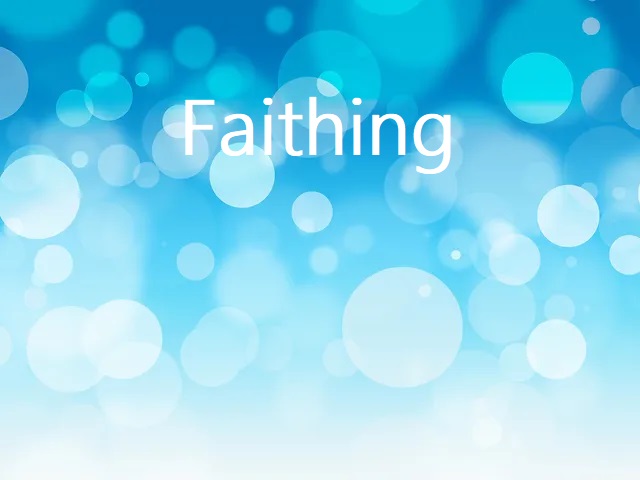
Faithing
Six weeks or so ago I sketched out my sermon topics through the end of the year. Frankly, I was pretty proud of myself. And I thought the series on “resistance” went fairly well, if I do say so myself. But I’ve been dreading this series on faith. Seems ironic, doesn’t it? The pastor should be excited to talk about faith… should find it easy to talk about faith. But I don’t.
I can give you the Merriam-Webster definition of faith as it relates to religion and spirituality: belief and trust in and loyalty to God; belief in the traditional doctrines of a religion; firm belief in something for which there is no proof.
That’s all well and good, but here’s my struggle… equating faith to belief makes it sound like faith is something we either possess or don’t possess, something that can be deemed right or wrong. And, it makes it sound like we can have faith or lose faith as easily as we can have our car keys or lose our car keys.
If faith is equal to belief, then what happens when we don’t quite believe what we were told in Sunday School anymore? What happens when we doubt what the church teaches? How many times have we heard people being told that they just have to have enough faith and their prayers will be answered? Faith as belief can easily become weaponized or become a tool of manipulation, judgment and punishment.
Marcus Borg once said that “Faith as belief is relatively impotent… You can believe all the right things and still be a jerk. And to soften that: you can believe all the right things and still be miserable, or still be in bondage, still be untransformed. So, the emphasis upon belief is, I think modern and mistaken. It’s also very divisive…”
So, let’s consider a different, more ancient way of understanding “faith.”
In Paul’s letter to the Corinthians, he talks about "walking by faith and not by sight." Remember that Paul wrote in Greek. Pistis is the Greek word that has been translated to the English word “faith.” But for Paul, pistis was a concept that included a whole way of living, but there is no English word that does this justice. Other scholars have suggested that “faithing” or “faithfulness” come closer to the original concept.
Having faith suggests that you’ve arrived, you’ve got it figured out and can now simply hold steady. Faithing, on the other hand is a spiritual way of walking through the world that doesn’t require one’s beliefs to be static.
Basically, Paul says "we’ve endured trial after trial – prison, beatings, estrangement, shipwreck, but we weren't destroyed. We have had our doubts about our path, about what to believe, what to say, what to do, but we haven't despaired. And, you know we’ve been persecuted by Romans and Jews alike, but we have never felt alone or abandoned. So, we walk forward faithing constantly, not necessarily able to see where we’re going, but trusting in the path."
Paul and his companions figured it out as they went. They trusted the process of learning and growing, and were open to a presence in the universe they personally experienced.
Faithing, I would suggest, requires an approach to life that is open, flexible, optimistic, generous, compassionate. Faithing asks us to release our fears and trust in mystery and goodness, even when life is difficult and painful. Faithing
This brings me to Krista Tippett who said, “faith is evolutionary.” I like faithing is evolutionary. In other words, as we walk through life faithing, we evolve. Our understanding of the divine in our lives evolves. Our understanding of life, synchronicity, religion, prayer… it all evolves. Or it should if we approach life with an open mind and heart, letting go enough to trust the process of allowing our experiences to change us, challenge us, and help us grow in wisdom and understanding. Faithing may sometimes even include intuitive knowing, or gut feelings.
Every week I wonder to myself what on earth I’m going to say on Sunday morning. In response to this concern/fear, I have two choices: I could work myself up into a panic, or I can practice faithing. To choose faithing means I become aware of my fear, remind myself that I’ve never NOT had anything to say on a Sunday morning, remind myself to trust the process, the universe, the spirit, the collective unconscious, Sacred Wisdom, and just start moving forward. And if I stall or get stuck, back off, take a breath, release control, ask for help, and move forward again.
Jurgen Moltmann once described faith as “the wakeful expectation of God, which touches all our senses.” It sounds like faithing to me… a conscious expectation that the divine will be with us in whatever happens – walking with us, carrying us, nudging us, challenging us, comforting us, guiding us. We can’t always see the evidence. Sometimes we have to sense it, intuit it, know it in the depth of our being, mystically aware and trusting - faithing.
I invite you to consider how you understand "faith" and what it might look like in your life to practice faithing instead.
Love & Light!
Kaye



